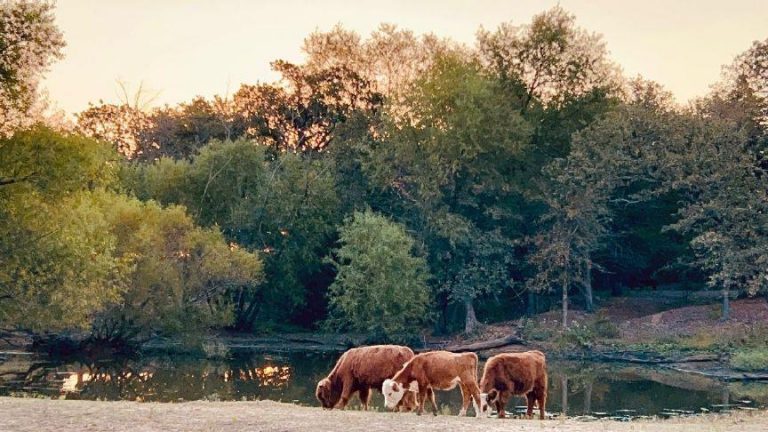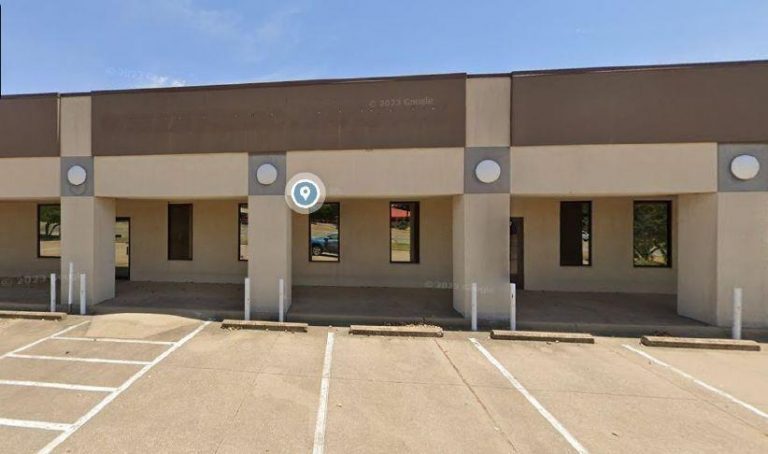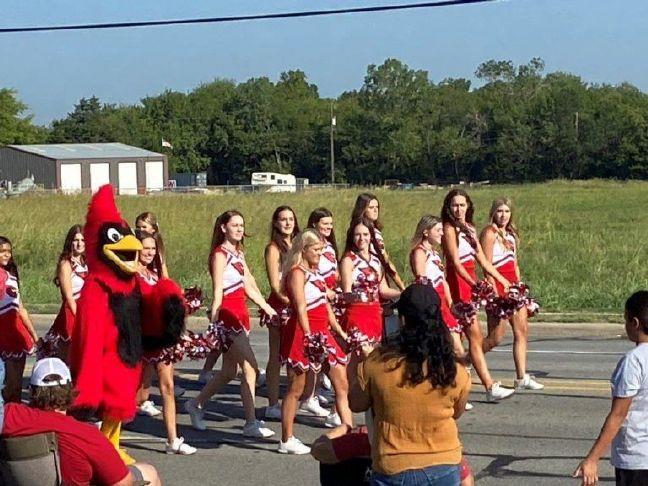Move over golden doodles, miniature bull dogs and all kinds of felines, miniature cows, sometimes called pasture puppies, are taking over social media.
Their diminutive size and big eyes can make even the most devoted city slicker dream of farm life.
In Whitesboro, Ryan and Hadleigh Gonzales and their children raise miniature cattle and other animals on their family farm.
“We support small farms and raise our livestock with biblical and traditional values,” said Hadleigh Gonzales in a recent interview.
She said their involvement with the mini cows started with a laugh.
“My husband randomly sent me a craigslist ad for “mini cows” and I cracked up laughing because I had never heard of them and thought it was a joke,” she said. “I said no way that’s an embarrassment to cattlemen and agriculture. I googled it and realized it was a thing, and they were highly valued by small farms. After he shared a few articles, I was all in and we began planning to go see them!”
They started with three. The first was a mini Hereford high park cross cow born and raised at a petting zoo. They named her Bertha and she is a family favorite.
“With her we got a red mini dexter heifer, Dixie,” she said. “She loved escaping so she is on a ranch with better fences now. We also got a dexter longhorn cross bull that same week. He was a well-built mini bull that produced tiny calves, unfortunately he was not a good fit for our farm. He is also on the ranch in Oklahoma with Dixie along with the first donkey ever born on our farm. Cows are herd animals, so we started with those three as we looked to add more.”
Their initial interest in the miniature cows was purely agricultural.
“We leased our property prior to owning our own cattle,” she said. “I don’t know the head count on the herd at that time, but they were standard size, and they weren’t rotational grazing, along with our mini mare and donkey, so the pasture didn’t have a chance to rest and regrow. When the herd was pulled off, we knew we wanted our own cattle, but we would have to do something different to avoid overgrazing and increase soil fertility for long term success. That’s when my husband came across mini cows and the benefits of their size for the goals we had.”
They are true first-generation farmers so this has been a learning experience for the whole family.
“We have gained a lot of knowledge through mini cattle forums, group discussions and just reading on certain topics, but mostly from hands on experience,” she said. “Each side of my family has lifelong cattlemen in northern Oklahoma, so we have called on them when we had questions. We exchange pictures and check on each other’s herds. It is special to be sharing the passion for raising livestock on a smaller scale.”
Websites and articles from sources like Newsweek trace the exploding popularity of miniature livestock, including cows and goats, to the COVID-19 pandemic when many people across the country started backyard chicken coops. The cows and goats, the articles say, were just a natural progression for those who had raised chickens. The miniature animals are also popular among families with younger children who are interested in showing animals but are not yet big enough to handle a full-sized cow or goat. The minis require less food and land than their full-sized relatives but can be pricey. The website minicows.us said the mini cows can range in price from $1,000 to $7,000. They can live from 12 to 15 years with some even living to be as old as 20 years.
The area’s biggest agricultural event, Texoma Exposition and Livestock Show does not currently have a competition for miniature cows. However, TELS Board Secretary and Grayson County Family & Community Health Agent Joyce White said all that is needed for that to change is for there to be three entries that want to compete in the show and a category could be added for the miniature cows.
Gonzales said there are many different kinds and sizes of miniature cows.
“They are in general context, a small version of large cattle breeds that vary in size, color and hair,” she said. “Breeders are also creating and coining cattle in their programs based on their markings. I really can’t keep up with it all. There are also registered and unregistered mini cows. The biggest factor in mini cows is obviously their height. The “standard mini,” ranges from 36 inches to 42 inches tall. A “mid-miniature” or “midsize” measures between 42-48 inches. The smallest is the micro mini measuring in at less than 36.
“The measurement should be taken at the hook, the topline across the back directly over back legs. The three size categories are based on their height at maturity and that age can vary based on the breed or who you ask, but generally 3 years old for cows and 4 for bulls. We own different breeds and sizes ranging from micro mini to midsize, they include Herefords, highlands, belted Galloways, angus and several are cross breeds like “Highford” to name a few.”
Size is not the only thing that sets the minis apart from their standard-sized cousins.
“Our mini cows are docile, gentle and very friendly,” she said. “They’ve never acted aggressive or silly and we’ve never given them a reason to. We often load cows, even our bulls, in the trailer just by walking them in. We have a cattle chute, but most are too small for it, so we’ve given shots and even pulled a nail out of a hoof with nothing but a cattle panel pen. Like mini cows, I too am pint size, so having a calm gentle herd that I can work by myself is important when my husband is at work. Each cow has a specific personality, and I can describe every single one. For example, the first cow we purchased, Bertha as we named her, is the leader.”
Bertha is calm and gentle around animals and people. Shea also loves apples and carrots and a good brisket scratch.
“She is the best mother and the kind of cow you know you could never replace,” Gonzales said. “Another example is our mini highland bull. While we respect him as a bull, he is a gentle and friendly, maybe slightly spoiled as well. He will wait at a door or window until you stop to acknowledge him and give him what he wants. He loves to be brushed and often stands on the porch like he’s guarding the house. We are extremely proud of our herds naturally calm friendly temperament and love mini cows for this reason. We trust them with our children and feel truly blessed to raise each one of them.”
She said their interest in the minis started in 2022 when they were looking into rotational grazing and land management.
“So, while we don’t have a long history of experience, we have a passion and love for them and are constantly learning and adapting how we operate to better our farm. We had no idea they were so popular until using social media. Since sharing our farm publicly, we have been overwhelmed with people’s interest and so many wanting to come see and pet them.”
Gonzales said the family understands people’s interest in their animals but stressed that selling their minis is not their primary focus.
“We are not animal breeders, of any kind. We started down the mini cow breeding road, but the practices used by most breeders (not all) in the mini cow industry didn’t align with our values and they’re a dime a dozen. So, while we do offer mini cows for sale, we do not stand for breeding for the purpose of creating a product to sell. We align ourselves with small working farms raising livestock biblically and ethically for self-sustainability and land enrichment. We don’t own any of our animals with the intention of making money off their offspring. Much to my husband’s dislike, I would be content to keep them all!”
The family often gets requests from people who want to come pet and brush the cows or take a tour of the farm to visit the animals.
“We’ve even been asked if they can volunteer to come do farm chores, which was a hard one to turn down!” she said. “While we are blown away and appreciate the interest and our cows would love extra attention and scratches, we are not interested in opening the farm to the public.”
They would rather offer their cattle to the community in ways that serve the community.
“I would love to take them to daycares, school programs, nursing homes, etc,” she said. “We want to share them with people that don’t get to experience farm life or people that need their spirits lifted. We also intend to offer them for parties, events and photography. However, we are very family oriented, we love our private, slow, simple life and would need to get the legalities of all that worked out. But, when and if God leads us to that, we will. Until then we’ll keep sharing the farm via social media and enjoy life on the porch with the cows.”
Farm life with miniature animals, Gonzales said, is still farm life in that it means early morning starts and evening chores.
“On a typical day, my husband does a quick check on cows and the other animals when he leaves for work, especially our bred cows. I get up and do a morning round of chores which change slightly based on the season and are not limited to the cows. In general, I make sure everyone is accounted for, check bred cows, open coops and pens, if we have any bottle babies they get their morning bottle.”
Water troughs are checked, if freezing ice needs to be broke in troughs and pond.
“I’m blessed to be a stay-at-home mom and homeschool our kids, so we tackle bible and bookwork which is often interrupted for calving, runaway goats etc., then we are free to spend time with the animals, clean pens, put more round bales out, or whatever is on the list,” she said. “We interact with the cows throughout the day, giving leftover fruit, brushing them or me obsessively videoing everything they do because they’re so cute. We do the evening chores as a family, for the most part. We haul water to pens, top off troughs, everyone gets dinner in their designated spot, we collect eggs, close all pens and coops for the night. I’m sure I’ve left things out because we do it by habit.”
Some think mini cows eat around one third of a standard cow, but the Gonzales have only raised midsize and mini cows.
“While it is true that they require less, we can’t compare them to standard size as we haven’t raised them,” she said. “However, our micro cattle eat noticeably less than even our midsize. Regardless of size, cattle need good pasture to graze, quality hay during winter, salt, minerals and protein tubs or liquid feed. Added protein is needed for bred cows and nursing cows. Calves need to be introduced to starter feed to allow for proper rumen development as well.”
While they enjoy interacting with their mini cows, they are not considered pets like a dog or a cat.
“We respect our mini cows as the bovine and livestock that they are,” she said. “Their agricultural purpose is to improve our land and soil while grazing our pasture. However, because we spend so much time with them and provide a peaceful environment, they do act very much like pets in that they are gentle, friendly and like our attention. Their pet like demeanor has allowed me to do silly things with them over the years like dressing them up for photographing and making videos to have for keepsake.”
The Gonzales family enjoys looking back on them and sharing them with others.
“Our porch is a gathering spot for all the animals, including the cows,” she said. “Many would be appalled at the manure on the porch, the windows smeared with cow licks. While it’s not always the most desirable thing and we could put a fence around the house to stop it, we get a kick out of ending the day in our rocking chairs on the porch surrounded by cows, goats, the whole farm, while the kids make mud pies.”
She said min cows are perfect for small farms like theirs because they require less space than their bigger relatives.
“It is recommended to have around an acre per mini cow, however this is highly dependent on where you live and the quality of pasture available. For rotational grazing it’s ideal to have several paddocks, or split pasture sections to move them and allow previously grazed paddocks to rest and regrow. These can be permanently fenced paddocks, or they can be trained to hot wire. They need room to roam and not get bored or they may try to escape.”
Gonzales said the temperament of the mini cows makes them a good choice for people who want to raise a variety of animals.
“We have a lot of animals, and they all interact with one another peacefully. One of our goats thinks she owns the front porch so she will challenge the cows that come on it, but then she backs down. Everyone free ranges peacefully under the protection of our dogs. The calves love to chase the chickens and cats, occasionally pester a turkey, but there’s no harm done. We don’t take for granted how blessed we’ve been with good animals. We hope to be adding new farm friends soon!” she said.




